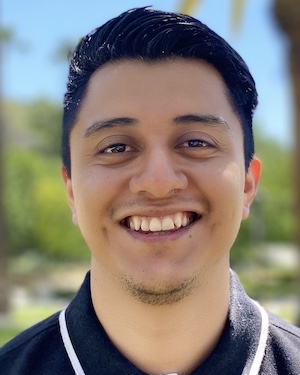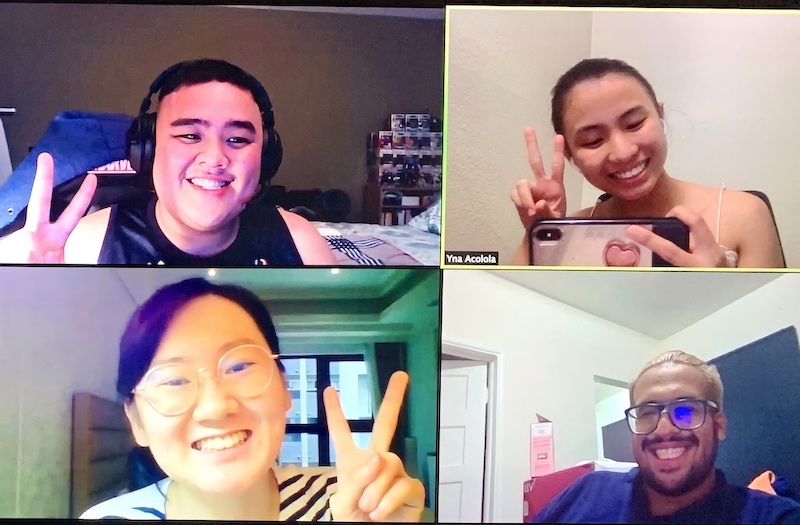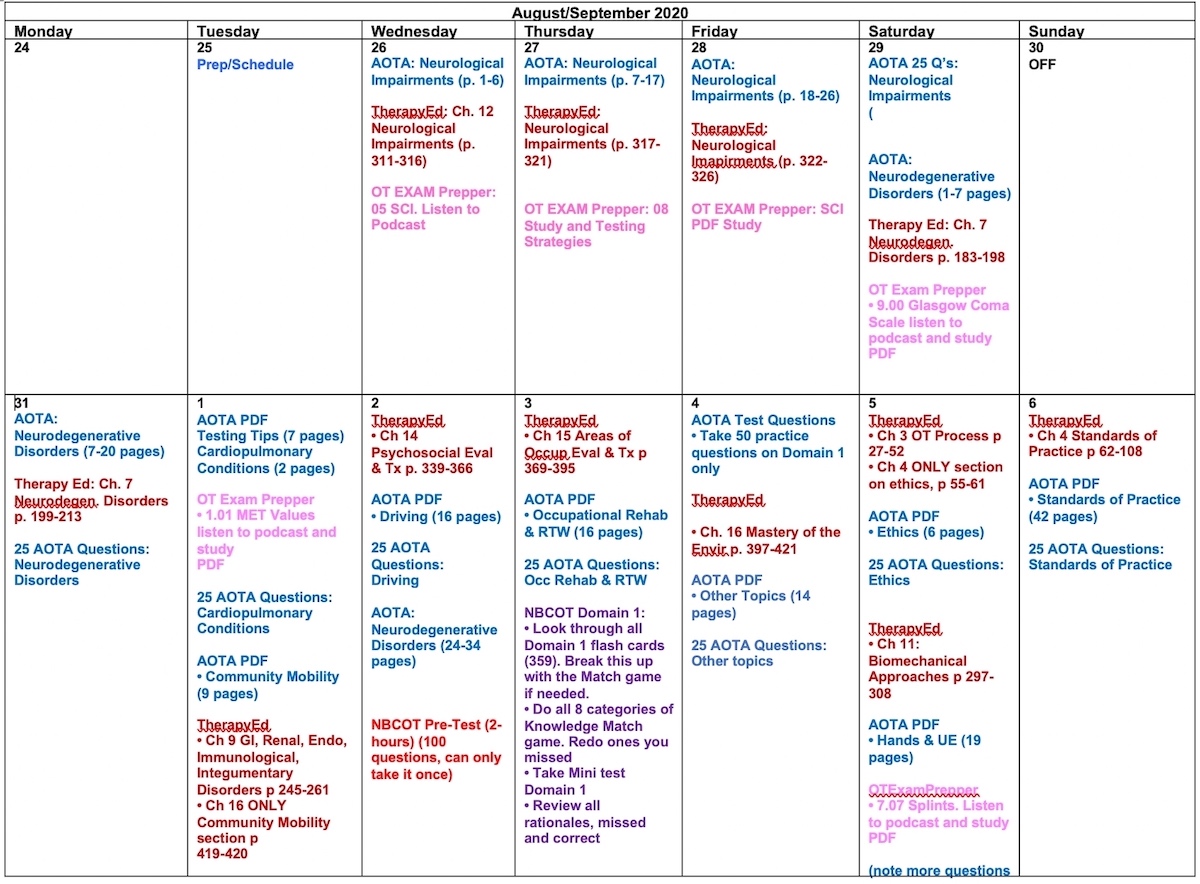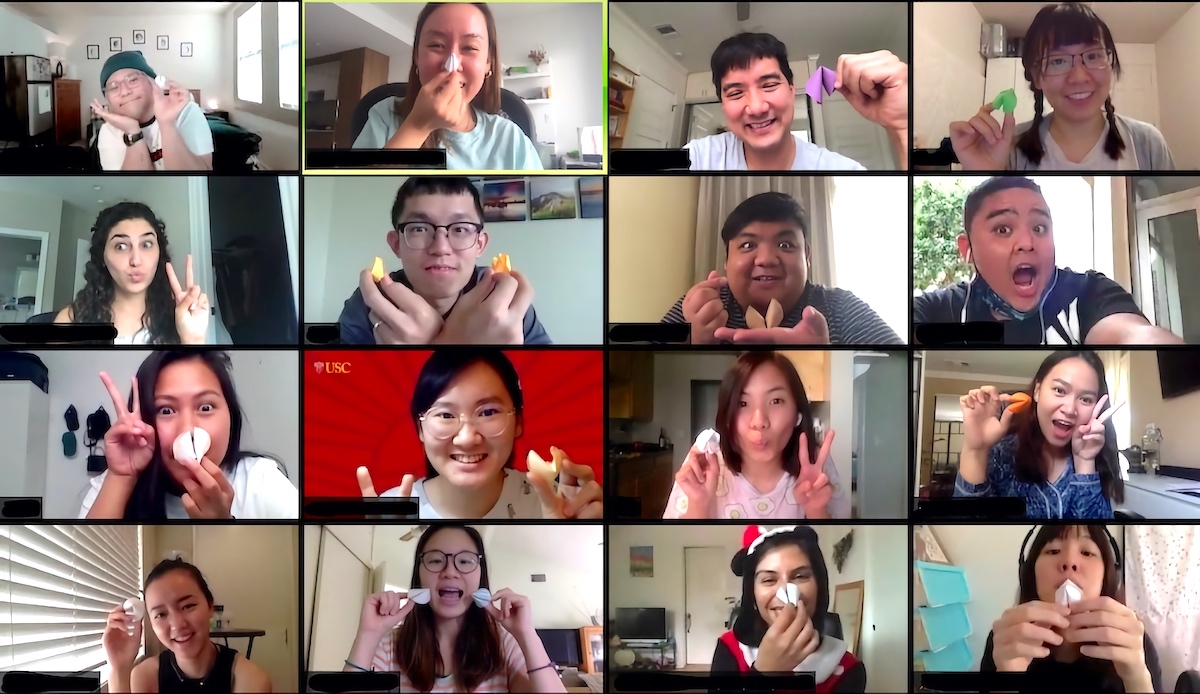Student Blog

Put Tracking Apps to the Test ⟩
September 30, 2020, by Bethany
In OT 563: Occupational Therapy in Primary Healthcare Environments, Dr. Valasek gave us an assignment. In primary care (and other OT environments), we may assign our clients a log to learn more about their lives and what affects their occupations, so we as students have to complete a log for ourselves. We get to better understand our practice, not just by practicing, but by experiencing what we may ask our clients to do. Dr. V let us know that we had to track for a week, but she was giving us two weeks to complete the assignment, helping us to understand that some weeks are just not good weeks to have to be responsible for tracking. She was also very helpful in permitting a variety of things that we could track (from mood to food) and in suggesting a variety of methods in which to complete this log. Beyond paper tracking methods, there are a surprising number of phone apps to track things and give reminders for goals, too! Daylio can be used for mood and habit tracking. Anxiety Tracker tracks . . . well . . . anxiety, if you hadn’t guessed. Habit Bull keeps you on track for habits. Lose It! can be used to track food and calories. And there are many more! I decided to check out Lose It! Let’s see how this goes . . .
Monday, Day 1
Today was spent familiarizing myself with the app. When you type in a food to Lose It!, there are so many options, it’s overwhelming. At the same time, I’m glad that they give options for things. I feel like I’d be even more stressed if I chose to do my own paper trackers and hand to configure ingredients and calorie count by myself. Or I’d get lazy and go back to fill in previous days’ meals without remembering exactly what I ate. I’m curious to see if I like the apps enough to keep going after this week.
Tuesday, Day 2
I didn’t eat lunch. I felt lazy about wanting to log food, got distracted by a letter my cousin sent me, and just ended up doing other things during my break. It makes me wonder if food logging accurately portrays what I eat in a week, but at the same time, part of logging is to bring the user’s awareness to their own situation and behaviors, so maybe I’m learning that I eat too much . . . hmmm. The funniest part of today was trying to recognize some of the Chinese food names in English. I had fun estimating dinner portion sizes with my mom, guessing if the amount of rice I ate was one cup or two thirds of a cup. My mom is a physician, so it was fun to hear that Lose It! is one of the apps that she recommends to her patients! She gets to learn a little bit more about it this week, too.
Wednesday, Day 3
I found what I like best about Lose It! You can scan barcodes on foods and it automatically inputs the food, the calories, everything! I tried it on my cereal in the morning, and it was almost more tempting to eat things out of the box, instead of homemade meals. Then, that evening, I discovered the recipe option! You can input all of the ingredients in a dish, put how many portions it makes, and it calculates everything for you. You can also save the recipe, so if it is a dish you make often, it is easy to go back and select. I asked my dad what went into his delicious eggplant dish, got an accurate calorie count for my meal and the recipe for a dish I love. I guess it takes longer than I thought to become accustomed to all of the characteristics of an app, and there are more helpful features than I imagined.
Thursday, Day 4
Today was easier. I got more into the habit of logging food right before I ate it. I also realized that previous meals pop up to make selection of eating leftovers easier. I noticed that the app also has water tracking, which I would love to use, but I don’t think I want to pay for the upgrade. The one downside of today is that Lose It! has me on a schedule with a calorie limit, and I really want brick toast. (If you look up “Oh My Pan!” you can find a very good visual example of my food craving for the day.)
Friday, Day 5
This was the first day I went over my calorie limit. Wow. That little red mark telling me I did something wrong was quite disheartening. I needed a reminder from someone close to me that food tracking is not always perfectly accurate, and that it is okay to have a cheat day. You have to take in the weekly budget numbers, too, and there is a lot more to account for in life that affects what you eat. In the end, I decided to let the app help me be aware of what I was eating, but not kill the vibe. And what can I say: The In-n-Out was worth it.
Saturday, Day 6
Tracking three meals a day has almost become habit. I also liked that I can input the exercise I completed for the day, and it goes into the net calorie count. It’s difficult to estimate calories burned from exercise, but it’s kind of nice to know that you can input that information. No crazy new discoveries on the app today. I’m looking forward to seeing how the week fills out.
Sunday, Day 7
Today my mom asked me, “Are you done tracking yet?” She wanted me to eat cookies with her for dessert. I can definitely see how this may be a downside to using a tracking app. It can affect even social aspects of life! But in the end, I think it’s kind of fun to be able to have more of an awareness of what I’m taking in. And I think I’ll continue to use the app, even if I track less regularly or even if I’m a little inaccurate, the most important thing is that it helps me become more aware of my own health.
I truly enjoy learning about the need for and the implementation of occupational therapy in primary care, and this class has definitely brought some unique learning experiences. I’m excited to keep learning about this area of OT and to keep building skills that I can use in the future.
⋯

Studying for the NBCOT! ⟩
September 28, 2020, by Daniel
The last couple of weeks have been busy, to say the least. The start of OTD residency, having class, and studying for the NBCOT exam have filled up my entire schedule. I would be lying if I said it’s been easy. There are days when I don’t even want to look at another paper of information after a long day of residency. Usually, I find myself studying 3-5 hours per day after 5PM, depending on how busy the week is. I have given myself about 6 weeks to study and will soon be sitting for the exam in 2 weeks! There are many challenges that I have faced with studying, and one of the challenges I want to share with you all is NBCOT study resources and tips to hopefully make your preparation a little better when the time comes for you to take this exam.
Study Tips
1. Choosing study materials that work for you
Everyone has a different learning style and there are a lot of options to choose from. This can be overwhelming because study materials cost money and you want to make sure you are getting what you need to pass this exam! I consider myself more of a visual learner and below I share the resources that worked for me.
- AOTA NBCOT Prep
This has been my main study resource as it includes PDFs for OT topics that may be on the exam. This also offers hundreds of practice questions and clinical simulations which are super helpful. Each question provides a rationale for the correct answer and the incorrect answers. The rationales are the most valuable component because it has helped improve my clinical reasoning. - NBCOT Study Pack
Personally, I have found these practice questions the most challenging, but that has helped me problem solve and understand how to answer questions. Most importantly, it includes practice exams with a time limit similar to the actual NBCOT, providing a score at the end to see where you are at. This study pack also includes flashcards and matching games to practice different topics. - TherapyEd
This book has a lot of information, so it could be overwhelming at times. However, it includes many exam hints, testing tips, and rationales to help you prepare. It also includes practice exams and clinical simulations. - OT Miri (free)
This has been one of my favorite study methods because Miri helps you understand concepts in a very fun way! She uses lots of visuals, mnemonics, and helps you apply the information into your personal life. Her style has helped me apply the information in a way that text may not be able to. She is also very honest about her experience studying for the NBCOT, not passing, and then re-taking the exam. - OT Rex (free)
This is a great video resource to learn topics in a very concise manner. The OT that makes these videos is great at organizing all of the information into one piece of paper that you can follow along and copy it for yourself to study. - OT Exam Prepper (free)
This podcast helps you learn mnemonics and find fun ways to help remember important concepts that you may need to know for the NBCOT. His examples include using Harry Potter, Star Wars, Lord of the Rings, etc. He also provides handouts with all the information to help you study! - OT Exam Audio (free)
This podcast is another option to listen and review important concepts. My personal preference is listening to this podcast while running.
2. Create a schedule
Creating a schedule to follow was really helpful for me in order to keep myself accountable. As you begin to plan your own schedule, you will find many templates from friends or online to help you study. This will depend on your study style, study materials, and study time. You can always modify an existing schedule and apply it to meet your needs. Below is a sample of the study schedule I used. This is a modified version of a template one of my classmates sent me.
3. Maintain a positive attitude/mindset
Build a positive mindset and attitude when preparing for the NBCOT exam. Yes, it is probably one of the most important exams of your life! And the thought of not passing comes to mind and you don’t want to even imagine that feeling. But, you have not taken the exam and you are doing the best you can to prepare! Finding ways to OT yourself and address this thinking pattern will be beneficial. Don’t let this exam defeat you before you even take it. Remember, you got into OT school, you have learned so much, and you have been able to make it this far. YOU have made this possible! Focus on the things you can control, prepare, put in the work, and remember that YOU are more than capable of passing this exam.
4. Take breaks
There are going to be many times when you may not have time to study, you may not feel motivated, or simply feel over it. In order to balance this time and take care of your mental health, make sure you take breaks! Whether this is exercising, watching a show, getting some food, find ways to treat yourself. YOU are working hard and doing the best you can.
“We are not perfect human beings, nor do we have to pretend to be, but it is necessary for us to be the best version of ourselves we can be.” — Satsuki Shibuya
⋯

Check In with Yourself ⟩
September 25, 2020, by Lamoni
Hi everyone, I simply want to check-in. This semester has been very busy and because the semester is squished into 12 weeks, we are already nearly halfway done. I feel like this week has been a particularly high stress week for individuals. Maybe it is stress about midterms, maybe it is stress because some of the half-semester electives are wrapping up, maybe it is stress about still feeling like you are trying to organize and plan for a semester that is already 42% done (points at self).
When attempting to check-in with my classmates, most of the responses that I receive are nervous chuckles (even in text form. You know the emoji). Honestly, when I check-in with myself, it is the same response. No matter the exact reason that you are stressed, it is valid. Being a graduate student is hard work, being a graduate student during times like this is several times harder. And, unfortunately, the other stressors in our lives continue to exist even while we are students.
I just want to take the time to emphasize that you are not alone in these emotions. Several students are feeling overwhelmed and exhausted. But I also want to emphasize that just because several people are experiencing it does not mean that it is healthy. While being a student, there is always some level of stress. However, it should not be debilitating.
It is important to cut out some time to check in with yourself.
- Take note of your current mood. What exactly is contributing to your stress? Not just “schoolwork” but what are the assignments? Create an organized action plan of how and at what time you will tackle each assignment. Organization requires some heavy lifting in the beginning but once you have found a schedule and planning routine that works for you, it helps a ton.
- What are some outside stressors that you can control? Are there some things that you are a part of but can cut back on?
- Now think about the last time you did something truly enjoyable. How long ago was that? How can you recreate that feeling sometime soon?
- Also think about the last time you engaged in self-care. What did you do and how long ago was that?
It may help to give yourself a visual by writing all of this out. If there is a large imbalance between stressors and enjoyable activities or coping strategies, you will eventually burn yourself out. Now is the time to create healthy habits and routines. Life, in general, comes with stress. Practicing healthy ways to handle it now will greatly benefit us in the future. You are a student, but you are a person first. Prioritize taking care of your mind and body. We only get one of each and it has to last.
⋯

Staying connected ⟩
September 23, 2020, by Yna
As an only child, I spend a lot of time hanging out with my friends, probably topping my list of favorite occupations. Although over the years I’ve appreciated being able to have my own private time, I also find a different kind of delightful companionship from them. And so without being able to go out due to the stay at home protocol currently in place, and adding the factor of being away from home, feelings of loneliness do arise from time to time. What definitely has been a huge support for my situation are the various (virtual) social events being held regularly at school, which I think students could really use especially during this time of limited socialization opportunities.
Global Initiatives, for one, hosted an International Student Welcome Celebration Zoom party, where students were allowed to gather virtually (in our pajamas!) and have time dedicated to just catch up, share experiences, and have fun together.
Members of the Global Initiatives team and some international students showing off their paper fortune cookies as part of the activity “Bake a Wish”
One of our activities was called “Bake a Wish” where we made paper fortune cookies. We picked out a quote from a list of inspirational messages that were provided by the students ourselves, to provide encouragement to our fellow students. My quote of choice says: “The goal is to be better than who you were yesterday,” to inspire me to keep going especially for when the more challenging times come.
Additionally, here is a photo of me with some Post-Professional Master’s students Elmo, Amy, and Ahmed virtually hanging out on a Friday night over Zoom. We played some games and really spent time talking to each other about life and many other things.

Post-Professional Master’s students Elmo Nicolas, Amy Yeu, and Ahmed Almeshari virtually having a “wine night” over Zoom
Despite the busy schedule, it is nice to have some time dedicated for socialization. Besides, what better way to destress after finishing 3 weeks of the fall semester than celebrate it with my fellow international students? After all, we, humans, are innately social beings; and social participation is one essential area of occupation that we must also fulfill in order to achieve a healthy balance.
To wrap this up, I want to highlight the importance of finding creative ways to make our presence felt to our friends and loved ones even though we’re socially distanced from each other. Each of us carries our own personal challenges, apart from the multitude of things currently happening in our society that may or may not be directly impacting us, so making it this far is really something to be recognized in itself. During challenging and unprecedented times like these, it is through each other where we can find support and draw strength from, so definitely reach out and seek support! Fight on, everyone!
⋯

Humans of USC Chan Volume 1 ⟩
September 21, 2020, by Calvin
Classes Diversity Videos What are OS/OT?
When I was applying to OT school, I remember that I really wanted to get different student perspectives on what programs were like and how they navigated graduate school. As a student ambassador, I feel so lucky to have the opportunity to share my experiences with all of you, but I know that there are so many other extraordinary voices in the division too!
So, I gathered some second-year Entry-Level Master’s students to come and talk about what their OT school experiences have been like so far! We went over topics related to what kind of OT they’re interested in, what their favorite classes and memories are, and what challenges they’ve faced. They even shared some advice for all of you thinking about applying to the program! If you watch it through YouTube, the video is time-stamped with each topic in case you ever want to go back to a specific conversation.
I hope you find this video helpful and that these diverse perspectives give you more insight into what student life is like in the Master’s program! Welcome to the Humans of USC Chan!
⋯







